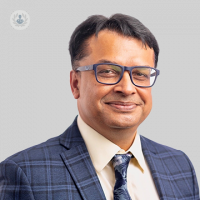Understanding back pain
Autore:Back pain refers to discomfort or pain felt in the back, ranging from mild to severe, often affecting the spine's various structures.
Here to offer his expert insight into back pain is Mr Amit Amit, renowned consultant in the field of neurosurgery and spinal surgery.

What are the causes of back pain?
Back pain is extremely common. Almost invariably, all of us will suffer back pain at some point in our lives.
The spine is a weight-bearing and mobile structure. Like with any mobile structure, it’s designed to degenerate. When it degenerates, this can lead to degenerative disc disease or arthritis (also called lumbar spondylosis) in the back, causing back pain.
There are also other, rare causes of back pain, such as tumours or inflammation of the joints in the back. However, in the majority of cases, degeneration (wear-and-tear) is the cause of back pain.
How is back pain diagnosed?
Most of the time, diagnosis involves a physical examination and a medical history. If back pain is intractable and it fails to resolve from conservative treatments or if back pain disrupts daily life, then further investigations are needed.
An X-ray is a basic investigation for back pain. However, it’s a very crude investigation that doesn’t provide enough information.
If back pain is really, really troublesome, we thus order an MRI of the lumbar spine, which provides a very detailed study of the various parts of the spine. Depending on the abnormalities that are picked up on the MRI, the cause of back pain is then diagnosed.
How is back pain treated?
Most of the time, back pain is managed conservatively by making lifestyle changes, losing weight, avoiding high-impact activities, keeping our back strong, physiotherapy, etc.
If these measures aren’t helpful, we often use steroid injections and sometimes more invasive procedures like radiofrequency denervation.
Extremely rarely, we perform operations to try and stabilise the back using surgical instrumentation.
When should I see a doctor for back pain?
Patients should seek medical attention:
- If back pain is so bad that the patient has to take strong painkillers, it affects quality of life, and it affects going back to work.
- If back pain starts to radiate to the legs and causes disturbances in bladder bowel function. This is when back pain becomes something more significant.
How can I prevent back pain?
Some of the things we can do to prevent prolonged, intractable, or chronic back pain include:
- Keeping our weight within a healthy limit – such as a BMI between 25 and 30.
- Avoiding very high-intensity, very high-impact activities.
- Keeping chronic conditions like diabetes tightly controlled.
- Keeping inflammatory conditions like psoriasis or gout tightly controlled.
These measures aren’t a guarantee, but to an extent, will help prevent the development of significant back pain.
If you’re experiencing worrying back pain and you would like to consult your options with an expert, don’t hesitate to request an appointment with Mr Amit Amit via his Top Doctors profile today.


